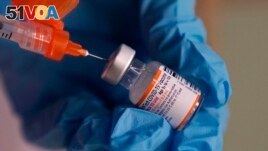14 February 2022
COVID-19 vaccines are saving lives but they cannot stop new versions of coronavirus from appearing. This has led scientists to ask the following questions: Are more shots needed? Should changes be made to existing shots? Or should new vaccines be developed?
Dr. Daniel Kuritzkes is infectious disease chief at Brigham & Women's Hospital. He told The Associated Press, "We need collectively to be rethinking what is the goal of vaccination."
Kuritzkes said, "It's unrealistic ... to believe that any kind of vaccination is going to protect people from infection, from mild symptomatic disease, forever." If the goal is preventing serious illness, he added, "we may not need to be doing as much fine-tuning of the vaccines every time a new variant comes."

FILE - Pharmacist Sima Manifar prepares a children's dose of the Pfizer COVID-19 vaccine during a vaccination clinic at City of Lawrence's "The Center," which serves seniors, families and the community, Wednesday, Dec. 29, 2021, in Lawrence, Mass.
As the virus changes or mutates, there is no way to know how bad the next variant will be. Already a sub-strain of Omicron with its mutations is spreading.
Jennifer Nuzzo of the Johns Hopkins Center for Health Security suggested the immediate solution is getting today's shots into more arms. This step, she said, will "reduce the opportunities for the virus to mutate..."
The immune system
The job of blocking infection falls to antibodies, which form after either vaccination or getting COVID-19. The antibodies are ready to fight back the next time a person is exposed.
But there is a problem: Mutations change the appearance of the spike protein that covers the coronavirus. That is why Omicron was able to break through that first defense. Also, the immune system is not designed to always be on high alert, so the antibodies that fight off infection decrease over time.
Thankfully, a part of the immune system called T cells helps prevent an infection from turning into severe illness. The protection T cells offer lasts longer because T cells recognize other parts of the virus that do not mutate as easily.
Issues with boosters
In some countries, people are getting a third shot, and in some cases, a fourth shot, to fight against decreased immunity and new variants. These shots are sometimes called boosters.
The booster further strengthened protection against serious illness. But research has shown that protection against symptomatic disease from Omicron is only about 70 percent – not as high as 94 percent against earlier variants.
Dr. Paul Offit is a vaccine expert at the Children's Hospital of Philadelphia. He said that endless boosting just to keep antibody levels high is "not a public health strategy that works."
Developing new vaccines
Pfizer-BioNTech and Moderna have two of the most effective vaccines against the coronavirus. The drug companies say they are now testing Omicron-specific boosters in some American adults.
However, it is not clear if health officials would drop vaccines proven to save lives for new ones in hopes of reducing breakthrough infections. Drug-makers can combine two different kinds of shots, but they would have to prove that the mixture works against the virus.
In the United States, the National Institutes of Health is spending about $43 million to develop so-called "pan-coronavirus" vaccines. The hope is to have one vaccine that can protect against more than one kind of coronavirus. Pan means all.
One idea is to have the shot send spike proteins from four to eight different versions of the virus rather than one as in today's vaccines. But NIH infectious diseases chief Dr. Anthony Fauci said it will take some time to develop such a vaccine.
Another idea is to create COVID-19 vaccines that can be squirted into the nose. The nasal vaccine can form antibodies ready to fight the virus right where it enters the body. This kind of vaccine is harder to develop than injected vaccines but several companies, including India's Bharat Biotech, have started research.
Protection varies around the world
The difficulty with any possible change to the vaccination strategy is that only 10 percent of people in some countries have received at least one shot of vaccines.
Additionally, some approved vaccines do not provide as much protection against Omicron as those from Pfizer and Moderna. For example, Yale University researchers found no Omicron-targeted antibodies in the blood of people given two shots of China's Sinovac.
It means that any change in vaccination strategy must be dealt with locally.
I'm John Russell.
And I'm Ashley Thompson.
Lauran Neergaard reported on this story for the Associated Press. John Russell adapted it for Learning English.
How well do you understand the story?
________________________________________________________________
Words in This Story
symptomatic -- adj. medical showing that a particular disease is present; relating to or showing symptoms of a disease
fine-tune -- v. to make small changes to (something) in order to improve the way it works or to make it exactly right
strain -- n. a group of closely related plants, bacteria, or animals
strategy -- n. a careful plan or method for achieving a particular goal usually over a long period of time